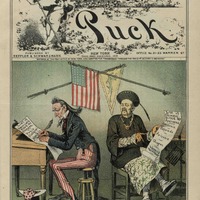 An Act to Grant to the Women of Wyoming Territory the Right of Suffrage and to Hold Office (1869) An Act to Grant to the Women of Wyoming Territory the Right of Suffrage and to Hold Office (1869) |
|
Wyoming was the first state to grant women suffrage rights. This act was the first in the world to grant women the right to vote and access to holding public office. It came 50 years before the 19th Amendment that guaranteed women's suffrage to the entire United States. Wyoming was the first of 15 states to grant women suffrage rights prior to the passage of the 19th Amendment.
|
 Criminal Docket, Sweetwater County Rock Springs Precinct, September 1885 Criminal Docket, Sweetwater County Rock Springs Precinct, September 1885 |
|
A Coroner’s Inquest investigated the murders of Chinese mine workers in Rock Springs, Wyoming Territory, in September 1885. While 16 white miners were arrested for participation in the massacre, no one was ever held legally responsible.
|
 Estimate of Property Loss Sustained by the Chinese in their respective camps at Rock Springs (1885) Estimate of Property Loss Sustained by the Chinese in their respective camps at Rock Springs (1885) |
|
In the wake of the 1885 Rock Springs Massacre, a U.S.- Chinese commission made up of politicians, ambassadors, and diplomats arrived in Wyoming Territory to collect testimony and tally the loss of property among Chinese laborers. The property lists accounted for individual property ownership, as well as property held in common by the Chinese miners.
|
 Grover Cleveland Speech Regarding Chinese Immigrant Workers (1886) Grover Cleveland Speech Regarding Chinese Immigrant Workers (1886) |
|
President Grover Cleveland's 1886 speech discusses the anti-Chinese violence at Rock Springs, Wyoming Territory. In it he argues that the United States is not responsible for this violence.
|
 Keeping Account (1885) Keeping Account (1885) |
|
This political cartoon, published in the wake of the Rock Springs Massacre that targeted Chinese laborers, depicted the practice of "indemnity," or compensation between nations in the wake of racial violence. The cartoon depicted Uncle Sam and the Emperor of China debating how and whether China would be compensated for the racial violence in Wyoming Territory.
|
 Memorial of Chinese laborers resident at Rock Springs, Wyoming Territory (1885) Memorial of Chinese laborers resident at Rock Springs, Wyoming Territory (1885) |
|
Over five hundred Chinese survivors of the 1885 racial violence in Rock Springs petitioned Huang Sih Chuen, the Chinese consul at New York, providing testimony of the white-led massacre and detailing the circumstances through which they lost property. Survivors demanded bodily protection and property compensation, while invoking recent treaty stipulations between the U.S. and China
|
 Racial Violence at Rock Springs, Property Compensation, and "Indemnity" during Chinese Exclusion Racial Violence at Rock Springs, Property Compensation, and "Indemnity" during Chinese Exclusion |
|
This teaching module investigates the legal concept of "indemnity" and property compensation in the wake of the Rock Springs Massacre, which targeted Chinese laborers in Wyoming Territory in 1885. When white miners attacked a Chinese labor community, Chinese survivors petitioned the New York consul and worked through diplomatic channels to demand redress. This module explores how the concept of "indemnity" relied on treaty obligations and was tied to property compensation during a moment when national legislation worked to further restrict Chinese immigration.
|
 Treaty of Guadalupe Hidalgo (1848) Treaty of Guadalupe Hidalgo (1848) |
|
The Treaty of Guadalupe Hidalgo reset the southern border between Mexico and the United States. Implications of the treaty included issues of citizenship, land, and legal status. Mexican nationals were admitted as U.S. citizens, legally defining them as white, but they could also be regarded as Indian on a case by case basis.
|
 Wyoming Declaration of Rights (1889) Wyoming Declaration of Rights (1889) |
|
The first article of the State of Wyoming's Constitution enumerates certain rights within the state. Wyoming Territory was the first government to grant women suffrage rights, and that right was preserved in the Declaration of Rights when organizing the state government.
|
 An Act to Grant to the Women of Wyoming Territory the Right of Suffrage and to Hold Office (1869)
An Act to Grant to the Women of Wyoming Territory the Right of Suffrage and to Hold Office (1869) Criminal Docket, Sweetwater County Rock Springs Precinct, September 1885
Criminal Docket, Sweetwater County Rock Springs Precinct, September 1885 Estimate of Property Loss Sustained by the Chinese in their respective camps at Rock Springs (1885)
Estimate of Property Loss Sustained by the Chinese in their respective camps at Rock Springs (1885) Grover Cleveland Speech Regarding Chinese Immigrant Workers (1886)
Grover Cleveland Speech Regarding Chinese Immigrant Workers (1886) Keeping Account (1885)
Keeping Account (1885) Memorial of Chinese laborers resident at Rock Springs, Wyoming Territory (1885)
Memorial of Chinese laborers resident at Rock Springs, Wyoming Territory (1885) Racial Violence at Rock Springs, Property Compensation, and "Indemnity" during Chinese Exclusion
Racial Violence at Rock Springs, Property Compensation, and "Indemnity" during Chinese Exclusion Treaty of Guadalupe Hidalgo (1848)
Treaty of Guadalupe Hidalgo (1848) Wyoming Declaration of Rights (1889)
Wyoming Declaration of Rights (1889)